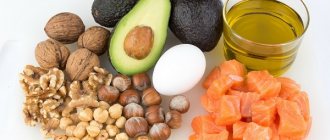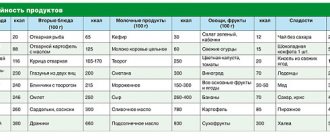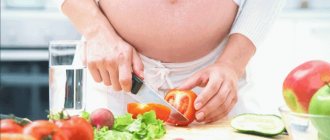General rules
Pregnancy itself is directly related to the physiological increase in a woman’s body weight, which is “planned” by the biological program of gestation.
The physiological norm of weight gain is determined by the weight of the developing fetus, placenta, amniotic fluid, increased size of the uterus and additional blood volume, providing oxygen for fetal respiration and nutrients, as well as an increase in fat in the abdomen, mammary glands and thighs, providing “ safety" of the fetus. On average, weight gain during the entire period of pregnancy normally varies between 10–15 kg. The norm for weight gain during pregnancy is quite individual and depends on the woman’s weight before the pregnancy period: with normal pregnancy weight, a woman can gain up to 15 kg during the entire period; if you are overweight - no more than 11 kg; for obesity - weight gain should not exceed 7 kg. It is important to take into account not only the overall weight gain, but also the rate of increase. On average, 40% of total weight gain occurs in the first half of pregnancy and 60% in the second. A pregnant woman's weight should increase constantly and evenly, since the normal development of the fetus depends on this.
However, many women, trying to eat in such a way as not to gain weight, still gain more body weight than normal during this period, which increases the risk of:
- development of late toxicosis ;
- decreased placental blood flow and the occurrence of hypoxia ;
- premature aging of the placenta;
- premature birth or post-term pregnancy;
- the occurrence of weakness of labor;
- the birth of a large fetus, complicating the course of pregnancy and the birth process;
- varicose veins;
- increased load on the cardiovascular system of a pregnant woman.
The main causes of pathological weight gain are most often: overeating caused by a strong feeling of hunger; changes in hormonal levels (the production of placental lactogen , progesterone , human chorionic gonadotropin , prolactin ), which increases fat deposition; physical inactivity (low physical activity); non-compliance with the principles of rational nutrition. Therefore, in such cases, pregnant women must be prescribed special nutrition for weight loss.
Diet for overweight pregnant women
The basic principles of nutrition for pathological weight gain are:
- strict control of the calorie content of your menu;
- eating in fractional portions (4-5 times a day), avoiding overeating;
- chewing food thoroughly;
- proper culinary processing of products;
- exclusion from the diet of foods that increase appetite and increase the excitability of the food center (strong broths, salty and spicy, dishes, spices and seasonings);
- carrying out fasting days (after 28 weeks of pregnancy);
- enriching the daily diet with foods rich in fiber;
- changing the structure of carbohydrates consumed towards reducing the consumption of simple, easily digestible carbohydrates by increasing the consumption of complex carbohydrates;
- limiting the amount of evening food intake and the time of its consumption (no later than 2–2.5 hours before bedtime) with the exclusion of fats.
The calorie content of a pregnant woman's daily diet when gaining weight above the physiological norm should vary between 2200-2500 Kcal, depending on the level of excess body weight from the norm, the duration of pregnancy and the condition of the fetus.
A daily diet for weight loss for a pregnant woman with normal weight includes 110-120 g of proteins (of which 70-90 g of animal proteins, which come from eating lean meat and fish, cottage cheese, milk, fermented milk products, chicken eggs), 80- 100 g of fats (of which 20-30 g are vegetable fats) and 300-350 g of carbohydrates.
The diet excludes all fatty and fried foods, pickles, smoked foods, and sweet carbonated drinks; preference should be given to lean varieties of red meat, poultry and fish. As a rule, products containing simple carbohydrates (sugar, jams, preserves, honey), confectionery and yeast-based baked goods are excluded, replacing them with products containing complex carbohydrates (fresh vegetables, fruits, cereals, dried fruits).
To lose weight in the diet, it is necessary to reduce salt intake to 5 g/day, since salt contributes to fluid retention in the body and the appearance of edema. A completely salt-free diet for pregnant women, especially during the hot season, is not recommended, as it can lead to disruption of the water-salt balance in the body.
Foods that stimulate appetite (onions, garlic, herbs, spices), delicacies, canned food, snacks, and alcohol-containing drinks are excluded. It is necessary to drink liquid in sufficient quantities (1.5–2 liters per day), avoiding strong coffee and tea. No special temperature conditions for food or methods of cooking food (except for frying) are required. If a pregnant woman has an allergic reaction to any food product in her diet, a hypoallergenic diet is prescribed with the exclusion of highly allergenic foods, according to the woman’s allergic profile (list of allergens).
With a rapid increase in body weight, it is recommended to do one day a week as a fasting day. On a fasting day, you should eat small meals - up to six times a day, without adding salt and sugar to your diet. To drink, use simple purified water, rosehip infusion, or weak tea. Below are options for fasting days for pregnant women with increased body weight:
- 1.5 liters of any fermented milk drink without fruit additives and sugar;
- 500 g low-fat cottage cheese;
- 400 g of lean boiled meat or fish and 500 g of fresh vegetables;
- 250 buckwheat core, boiled without salt.
What should a woman's weight be during pregnancy?
Doctors carefully monitor the condition of pregnant women, tracking any deviations from the norm. At each appointment, one of the required data collections is weight control. There are special norms that expectant mothers are not recommended to go beyond; they differ depending on the initial weight and age. So, curvy ladies are not allowed to gain a lot, and those who are too thin are even recommended.
Any kilograms gained according to the norm will be for the benefit of the body, because they consist of the following indicators:
- fetal weight;
- placenta;
- additional liters of blood;
- necessary fat reserve;
- water;
- retained liquid.
On average, a woman should gain 9-15 kg when expecting one child, and 16-21 kg if there are twins. To calculate a more accurate set for a particular woman, doctors use a BMI table.
Formula: weight (kg)/height (m)².
Data on weight gain depending on pre-pregnancy values:
| BMI | Shortage | Norm | Bust |
| <19 | <12 | 12,5-18 | 18> |
| 19-25 | <11 | 11,5-16 | 16> |
| 26> | <7 | 7-11,5 | 12> |
A prerequisite for controlling weight gain is weighing on the same scales. This is due to the fact that different devices will show different values, which can mislead the expectant mother and cause panic.
Authorized Products
In the diet during pregnancy, with a body weight exceeding the norm, it is necessary to introduce first courses in the form of weak and low-fat vegetable, meat and fish broths and soups with the addition of cereals or potatoes in a volume of no more than 200 ml/day. For meat products, lean varieties of red meat (veal, beef), rabbit, and poultry (turkey, chicken) are recommended. The content of meat dishes in the daily diet should not exceed 150 g. Meat dishes are recommended to be steamed, baked in the oven, after preliminary boiling.
It is recommended to cook steam cutlets and puddings, meat rolls, meatballs, meat and vegetable zrazy. The daily intake of seafood and fish dishes from low-fat fish varieties (pike perch, cod) should be about 150 g, from which it is better to prepare meatballs, steamed fish cutlets, rolls with vegetables, and fish puree. Of the fats, vegetable oils must be present in the diet.
Be sure to include in the diet whole milk in a volume of 200 ml/day and various dairy (fermented milk) products with low fat content. Consumption of bread and flour products should not exceed 100-150 g per day. Preference should be given to day-old rye bread or bran bread, wholemeal bread, savory cookies or biscuits. The diet includes chicken eggs (1-2 per week), preferably in the form of steamed omelets or soft-boiled.
It is better to use pasta (vermicelli, spaghetti, noodles) in soups, and for side dishes give preference to porridges from various cereals. In the diet of a pregnant woman with increased body weight, a large proportion should be occupied by vegetables and fruits (tomatoes, bell peppers, different varieties of cabbage, cucumbers, zucchini, pumpkin, carrots), both raw and processed. Parsley, dill, lettuce, and green onions are used as seasonings for main dishes.
Drinks in the diet should include weak tea with milk, rosehip decoction, unsweetened fruit and berry compotes, diluted pureed juices from various berries and fruits, and still mineral water.
Table of permitted products
| Proteins, g | Fats, g | Carbohydrates, g | Calories, kcal | |
Vegetables and greens | ||||
| zucchini | 0,6 | 0,3 | 4,6 | 24 |
| cauliflower | 2,5 | 0,3 | 5,4 | 30 |
| potato | 2,0 | 0,4 | 18,1 | 80 |
| carrot | 1,3 | 0,1 | 6,9 | 32 |
Fruits | ||||
| apricots | 0,9 | 0,1 | 10,8 | 41 |
| watermelon | 0,6 | 0,1 | 5,8 | 25 |
| melon | 0,6 | 0,3 | 7,4 | 33 |
| nectarine | 0,9 | 0,2 | 11,8 | 48 |
| peaches | 0,9 | 0,1 | 11,3 | 46 |
| apples | 0,4 | 0,4 | 9,8 | 47 |
Berries | ||||
| strawberry | 0,8 | 0,4 | 7,5 | 41 |
| raspberries | 0,8 | 0,5 | 8,3 | 46 |
Cereals and porridges | ||||
| buckwheat (kernel) | 12,6 | 3,3 | 62,1 | 313 |
| cereals | 11,9 | 7,2 | 69,3 | 366 |
| pearl barley | 9,3 | 1,1 | 73,7 | 320 |
| white rice | 6,7 | 0,7 | 78,9 | 344 |
| barley grits | 10,4 | 1,3 | 66,3 | 324 |
Confectionery | ||||
| marshmallows | 0,8 | 0,0 | 78,5 | 304 |
| meringues | 2,6 | 20,8 | 60,5 | 440 |
| paste | 0,5 | 0,0 | 80,8 | 310 |
Raw materials and seasonings | ||||
| milk sauce | 2,0 | 7,1 | 5,2 | 84 |
Dairy | ||||
| milk | 3,2 | 3,6 | 4,8 | 64 |
| kefir 2% | 3,4 | 2,0 | 4,7 | 51 |
| cream 15% (low fat) | 2,3 | 15,0 | 3,6 | 161 |
| sour cream 15% (low fat) | 2,6 | 15,0 | 3,0 | 158 |
| curdled milk | 2,9 | 2,5 | 4,1 | 53 |
Cheeses and cottage cheese | ||||
| cottage cheese 1.8% (low-fat) | 18,0 | 1,8 | 3,3 | 101 |
Meat products | ||||
| boiled beef | 25,8 | 16,8 | 0,0 | 254 |
| beef liver | 17,4 | 3,1 | 0,0 | 98 |
| boiled beef tongue | 23,9 | 15,0 | 0,0 | 231 |
| boiled veal | 30,7 | 0,9 | 0,0 | 131 |
| rabbit | 21,0 | 8,0 | 0,0 | 156 |
Bird | ||||
| boiled chicken | 25,2 | 7,4 | 0,0 | 170 |
| turkey | 19,2 | 0,7 | 0,0 | 84 |
Eggs | ||||
| chicken eggs | 12,7 | 10,9 | 0,7 | 157 |
Fish and seafood | ||||
| salmon caviar granular | 32,0 | 15,0 | 0,0 | 263 |
Oils and fats | ||||
| butter | 0,5 | 82,5 | 0,8 | 748 |
| ghee | 0,2 | 99,0 | 0,0 | 892 |
Non-alcoholic drinks | ||||
| mineral water | 0,0 | 0,0 | 0,0 | — |
Juices and compotes | ||||
| apricot juice | 0,9 | 0,1 | 9,0 | 38 |
| carrot juice | 1,1 | 0,1 | 6,4 | 28 |
| pumpkin juice | 0,0 | 0,0 | 9,0 | 38 |
| * data is per 100 g of product | ||||
Diet during pregnancy in the 1st trimester
A diet during pregnancy for weight loss is rarely necessary. During this period, the body is not yet configured to accumulate reserves, the fetus is just settling in and getting along in the body, and changes in hormonal levels can even contribute to the loss of several kilograms.
However, women who are underweight before pregnancy and do not suffer from toxicosis can try the following menu for weight loss for a week:
| Day of the week | Breakfast | Snack | Dinner | Snack | Dinner |
| Monday | Oatmeal with water and milk in a ratio of 2:1 | Apple | Steamed chicken cutlets, boiled jacket potatoes | Banana, 1 tbsp. milk | Zucchini stewed with milk, steamed chicken breast |
| Tuesday | Cottage cheese up to 2% fat with a handful of dried fruits | Handful of nuts | Vegetable soup, breast under onion-cheese coat, 2 breads | Chicken egg 2 pcs. | Long grain polished rice, steamed red fish |
| Wednesday | Millet porridge with pumpkin | 90 g cottage cheese 2% and 100 g yogurt without additives | Diet shawarma | 90 g cottage cheese 2% and 100 g yogurt without additives | Sliced vegetables without dressing, boiled squid, grain bread |
| Thursday | Apple and oatmeal pancakes | 1 tbsp. ryazhenka | Vegetable puree soup, buckwheat, oven-baked chicken drumsticks | 1 tbsp. kefir 1% | Salad with seafood, bread with a thin slice of cheese |
| Friday | Cheesecakes with raisins | Yogurt without additives | Chicken with rice in a pot, salad | Handful of nuts | Rice with mushrooms, vegetable salad |
| Saturday | Rice porridge with water and milk | Banana, 1 tbsp. kefir | Steamed vegetables and red fish | Apple | Baked skinless chicken thighs, steamed grated carrots |
| Sunday | Scrambled eggs with tomatoes | 1 tbsp. kefir, bread | Beef broth soup, 2 slices grain bread | Plain yogurt, 2 prunes | Baked mackerel, rice with vegetables |
All this must be included in the daily calorie intake, calculated taking into account a decrease of 10%. When cooking, do not use oil and reduce milk consumption to 800 ml per day. Salt should be no more than 9 g per day.
Prohibited:
- ready-made store products;
- confectionery;
- any juices;
- smoked meats;
- sausages;
- honey;
- citrus;
- sugar-sweetened drinks.
Fully or partially limited products
Fatty meat broths, white bread, baked goods, all fatty meats, sausages, sausages, dumplings, canned food, smoked meats, fatty varieties of sea and river fish, canned fish, salted fish, crab sticks are excluded from the diet. The intake of flour sweets, chocolate, ice cream, sweets, cakes and pastries, preserves, jams, honey, sugar is limited. It is not allowed to include confectionery fats or mayonnaise in the diet.
You should limit your diet to peas, beans, lentils, semolina, spicy and smoked cheese. Butter is limited to 15 g/day. Green peas, radishes, and beets are used to a limited extent.
Condensed milk, fast food, as well as products with a high content of dyes and preservatives (processed cheese, yogurt, curd mass) are excluded from the diet.
Grapes and bananas should be excluded from fruits. It is prohibited to use any sweeteners, drink carbonated drinks, strong tea and coffee, and alcohol.
Table of prohibited products
| Proteins, g | Fats, g | Carbohydrates, g | Calories, kcal | |
Vegetables and greens | ||||
| vegetables legumes | 9,1 | 1,6 | 27,0 | 168 |
| carrot | 1,3 | 0,1 | 6,9 | 32 |
| beet | 1,5 | 0,1 | 8,8 | 40 |
| pumpkin | 1,3 | 0,3 | 7,7 | 28 |
| horseradish | 3,2 | 0,4 | 10,5 | 56 |
Fruits | ||||
| bananas | 1,5 | 0,2 | 21,8 | 95 |
Berries | ||||
| grape | 0,6 | 0,2 | 16,8 | 65 |
Cereals and porridges | ||||
| semolina | 10,3 | 1,0 | 73,3 | 328 |
Bakery products | ||||
| white bread crackers | 11,2 | 1,4 | 72,2 | 331 |
Confectionery | ||||
| jam | 0,3 | 0,2 | 63,0 | 263 |
| jelly | 2,7 | 0,0 | 17,9 | 79 |
| candies | 4,3 | 19,8 | 67,5 | 453 |
Ice cream | ||||
| ice cream | 3,7 | 6,9 | 22,1 | 189 |
Raw materials and seasonings | ||||
| mustard | 5,7 | 6,4 | 22,0 | 162 |
| ketchup | 1,8 | 1,0 | 22,2 | 93 |
| mayonnaise | 2,4 | 67,0 | 3,9 | 627 |
| honey | 0,8 | 0,0 | 81,5 | 329 |
| ground black pepper | 10,4 | 3,3 | 38,7 | 251 |
| sugar | 0,0 | 0,0 | 99,7 | 398 |
Meat products | ||||
| fried pork | 11,4 | 49,3 | 0,0 | 489 |
| raw smoked pork belly | 7,6 | 66,8 | — | 632 |
Sausages | ||||
| smoked sausage | 28,2 | 27,5 | 0,0 | 360 |
| dry-cured sausage | 24,1 | 38,3 | 1,0 | 455 |
| pork sausages | 11,8 | 30,8 | 0,0 | 324 |
Bird | ||||
| fried chicken | 26,0 | 12,0 | 0,0 | 210 |
| smoked chicken | 27,5 | 8,2 | 0,0 | 184 |
| duck | 16,5 | 61,2 | 0,0 | 346 |
| goose | 16,1 | 33,3 | 0,0 | 364 |
Fish and seafood | ||||
| dried fish | 17,5 | 4,6 | 0,0 | 139 |
| smoked fish | 26,8 | 9,9 | 0,0 | 196 |
| canned fish | 17,5 | 2,0 | 0,0 | 88 |
Oils and fats | ||||
| creamy margarine | 0,5 | 82,0 | 0,0 | 745 |
| animal fat | 0,0 | 99,7 | 0,0 | 897 |
| cooking fat | 0,0 | 99,7 | 0,0 | 897 |
Non-alcoholic drinks | ||||
| mineral water | 0,0 | 0,0 | 0,0 | — |
| coffee with milk and sugar | 0,7 | 1,0 | 11,2 | 58 |
| black tea with milk and sugar | 0,7 | 0,8 | 8,2 | 43 |
Juices and compotes | ||||
| jelly | 0,2 | 0,0 | 16,7 | 68 |
| rose hip juice | 0,1 | 0,0 | 17,6 | 70 |
| * data is per 100 g of product | ||||
Diet during pregnancy in the 2nd trimester
A diet during pregnancy for weight loss in the 2nd trimester may be required for women who regularly overeat sweets, starchy foods, or fried foods. During this period, the woman usually stops feeling unwell, and the body, additionally spurred on by hormones, strives to replenish the energy spent and stock up on additional energy.
It is worth stopping signals about overeating and false need for harmful foods. If you have already gained weight and need to get rid of it, preventing further growth, then you should adhere to the following menu:
| Day of the week | Breakfast | Snack | Dinner | Snack | Dinner |
| Monday | 2 egg omelette | 1 tbsp. kefir 1%. | Mushroom puree soup, crushed potatoes, pieces of poultry fillet | handful of berries | Steamed broccoli with oven-baked chicken cutlets |
| Tuesday | 1 tbsp. milk, 2 breads with cheese | Handful of nuts | Buckwheat vegetable soup, oven cutlets, vegetable salad | Yogurt without additives | Potato casserole with ground beef |
| Wednesday | Oatmeal | 2 eggs | Chicken broth, boiled potatoes, steamed salmon | Handful of nuts | Scrambled eggs with tomatoes |
| Thursday | Millet porridge with pumpkin | 90 g cottage cheese 1.8%, 3 tbsp. yogurt | Soup, turkey with vegetables, bread | 90 g cottage cheese 1.8%, 3 tbsp. yogurt | Homemade shawarma |
| Friday | Buckwheat | Yogurt without additives | Salad without dressing, stewed cabbage with pieces of beef | Bread with cheese | Mashed potatoes with stewed pollock fillet |
| Saturday | Cottage cheese 2% with banana | Soft cottage cheese with raisins | Soup, pilaf in a pot without oil | Dates and 1 tbsp. milk | Omelette |
| Sunday | Carrot-curd casserole | Dates and 1 tbsp. milk | Zucchini with chicken fillet and tomato sauce | 2 eggs | Buckwheat, poultry |
Small, frequent meals will help you feel full for as long as possible and not overeat. Recommendations and prohibited foods are the same as in the 1st trimester.
Advantages and disadvantages
| pros | Minuses |
|
|
Comments from nutritionists
Many pregnant women inadequately assess the risks to themselves and the fetus with significant weight gain. When they gain weight of 15 kg or more, they are at risk of developing late toxicosis or gestosis , which is characterized by the appearance of edema , increased blood pressure and impaired renal function. Without timely treatment, such complications can cause the development of eclampsia (convulsive syndrome against the background of rising blood pressure), premature placental abruption, and uterine bleeding.
One of the factors of excessive weight gain is physical inactivity . The opinion about the need to avoid physical activity during pregnancy is erroneous. A woman at any stage of pregnancy is recommended to have a moderately active lifestyle and dosed physical activity: special gymnastics for expectant mothers, walks, swimming in the pool, breathing exercises.
Dosed physical activity ensures high-quality oxygen saturation of the blood and increases blood supply to the fetus, improving the process of its nutrition and breathing. The list of prohibited activities includes only those associated with stress on the abs and sudden movements. An individual version of physical activity should be selected after consultation with a doctor, taking into account the characteristics of the course and duration of pregnancy.
What are the dangers of being overweight during pregnancy?
In addition to serious harm to the pregnant woman’s body, excess weight increases the risk of complications for the child.
The risks for the mother are:
- disruption of the cardiovascular system;
- varicose veins;
- increased load on the spine;
- diabetes;
- hypertension;
- hypercoagulability;
- threat of premature birth, miscarriage, intrauterine fetal death;
- is an indication for caesarean section;
- complex postpartum rehabilitation;
- birth of a large baby.
For a child:
- hypoxia;
- violation of the proportions of the pelvis and head;
- lack of nutrients;
- diabetes;
- convulsive syndrome;
- heart disease;
- tendency to be overweight in the future;
- inaccurate assessment of fetal condition due to the difficulty of obtaining data.
Reviews and results
As a rule, a strict diet for pathological weight gain allows you to reduce weight and the rate of its growth, thereby reducing the potential risk for the mother and fetal development. Of course, individual indicators vary and this is quite natural.
- “...Yesterday I had an appointment with my doctor. Pregnancy 28 weeks. The weight gain was 1.5 kg in 14 days. Despite feeling normal and having no visible swelling, I was prescribed a diet to lose weight during pregnancy. They recommended doing exercises for pregnant women and, if possible, walking in the fresh air. Now I count calories and monitor weight gain daily”;
- “... At the stage of pregnancy planning, I re-read the entire forum dedicated to dietary nutrition during large weight gain. The range of opinions is very wide, ranging from doubts and the question of whether pregnant women can go on a diet, to specific personal examples and recommendations. I have always had problems with weight, I went on various diets, most recently on separate meals. However, as I understand, separate nutrition and pregnancy are incompatible, just like all mono-diets. During the consultation, I was advised to try to bring my weight back to normal before pregnancy, and during pregnancy to follow a diet and strictly control my weight.”
Diet for weight loss during pregnancy: pros and cons
Diet during pregnancy for weight loss is not contraindicated, but only in cases where a reasonable approach is used. Expectant mothers are prohibited from fasting, because this provokes the production of stress hormones and a lack of nutrients, which negatively affects the child.
Under no circumstances should mono-diets be used without prior permission from a doctor. Only a gynecologist, having assessed the risk of side effects from obesity and the possible consequences of fasting days, can prescribe them.
If the weight gain limit is exceeded, the observing doctor may recommend excluding fruits from the menu due to the large amount of glucose. Also, if a woman experiences swelling, they may suggest reducing the amount of fluid consumed. True, this does not apply to situations where water retention is associated with kidney diseases.
Excess weight in a woman during pregnancy can negatively affect the health of the child, so expectant mothers are advised to follow a special diet to lose weight.
This diet has undoubted advantages:
- weight loss;
- removal of fluid;
- normalization of pressure;
- acceleration of metabolism;
- cleansing of toxins;
- improving the condition of skin, hair and nails;
- reduction of swelling of the limbs;
- improvement of general condition.
Possible consequences of giving up fruit:
- decreased immunity;
- insufficient intake of glucose and fructose;
- lack of vitamin C;
- weakness;
- drowsiness;
- disruption of the gastrointestinal tract.
The best diet during pregnancy is not to limit the list of foods, but to limit the daily caloric intake. This will help maintain the supply of all vitamins, minerals and nutrients and will not harm the baby’s development. You need to reduce no more than 10% of kcal from the norm.











